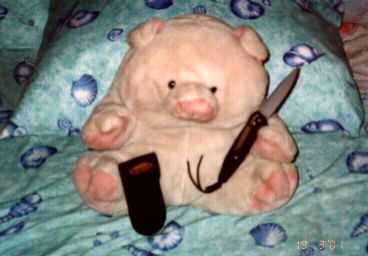| Sharp Object Collection |
Foreward
It needs to be mentioned in this enlightened, politically correct age, that I view knives as tools, not weapons. Useful, indispensible tools to make life that much easier. Without knives, we wouldn't be able to prepare food, open envelopes, shorten rope, or do any one of the thousand little cutting tasks we face daily. I am not a psycho mercenary wannabe, nor am I obsessed with knife-fighting or other macho bullshit. I am a law-abiding citizen who happens to like fine knives. Violent people will be able to turn anything into a weapon. A baseball bat, screwdriver, or (god forbid!) a chainsaw in the hand of a maniac can be a deadly weapon when used outside its intended purpose.
My friends, parents and co-workers
often ask me why I buy US$100 knives when I can get brand
"X' knives from roadside pedlars for US$5. I usually turn
the question around and ask them why they buy BMWs when they can
buy a US$5000 Proton Iswara. In a word: quality. Today's
industrial world is one of quantity. Huge factories churn out
products at the rates of thousands per hour. The consumer of
today buys something and discards it when it falls apart a couple
of years later. Rare indeed are the products that continue to
give good service year after year, in in some cases, generation
after generation. Good knives do just that. And some people (like
me) actually like it that way.
Check out
my knife collection
Andrew L
18 Oct 2000
![]()

[Proud owner of a MicroTech SOCOM clip point]
Knives & Knifemaking
Knives are among our oldest tools from our time on the planet. The first knife was probably a sharp-edged piece of stone picked off the ground. In time, our ancestors learnt to sharpen those stones and afix handles to better fulfill the task at hand. While knives are seldom made of stone today, their usefulness has not diminished since the first stone knife was used to cut something. As long as there are humans on the planet, there will always be things needed to be cut.
The modern knife is made of a staggering variety of materials, from the traditional steel alloys to space-age materials like carbon fibre, titanium, and cobalt alloys. While many of today's knives are made in batches of thousands in huge automated factories, there remains a small community of craftsmen who choose to preserve the age-old tradition of knifemaking old way: crafting their tools one at a time, using nothing more sophisticated than skilled hands. While the masses buy and discard cheap knives, some of us enjoy buying and using fine knives made the way they have always been.
Handmade Knives
Handmade knives by reputable craftsmen are not cheap. A small folding knife could cost as much as US$500. However, the people who collect and use handmade knives don't see these prices as excessive for the quality of the product. They admire the precision craftsmanship of the maker and the timeless elegance of the design. They understand the many years it took for the craftsman to develop his skills, and the dedication to perfection that is reflected in every knife that leaves their shop. They like having the ability to chat with the maker to better be able to tailor their purchase to their own individual tastes. But most of all, they enjoy owning and using a very personal tool that will last their whole lifetimes (and probably that of their children as well). There are knives made 30 years ago that have been used hard and resharpened many times, yet work as well as the day they left their maker's shop.
Speciality Knife Companies
While handmade knives have their admirers, their price has put them out of reach for most people, especially from countries which have a steep exchange rate to the US dollar. To cater for a niche in the industry for a high-quality product at reasonable cost, a new type of company has emerged in recent times: the speciality knife company. While these companies utilize state-of-the-art equipment like computer controlled machinery and lasers cutters, they also employ skilled craftsmen for final assembly and finishing of their products.
These companies bridge the gap between the handmade knifemakers and the big factories. They produce greater quantities of product than individual knifemakers (thus reducing the costs) at higher quality (through stringent quality control) from the generic brand name factories. Some examples are Spyderco, Benchmade, Cold Steel, MicroTech and SOG who together have led the cutlery market by introducing many new innovations especially in the area of folding knife construction. Many of these innovations like new materials (carbon fibre, titanium), better locking mechanisms (liner lock) are as a result of collaborations with handmade knifemakers.
Knife Links
General links for knife-related information:
Links to my favourite handmade knifemakers:
Links to manufacturer sites:
Links to dealer sites:
Home . Alternity . Legend of the 5 Rings . Warhammer FRP . Other.